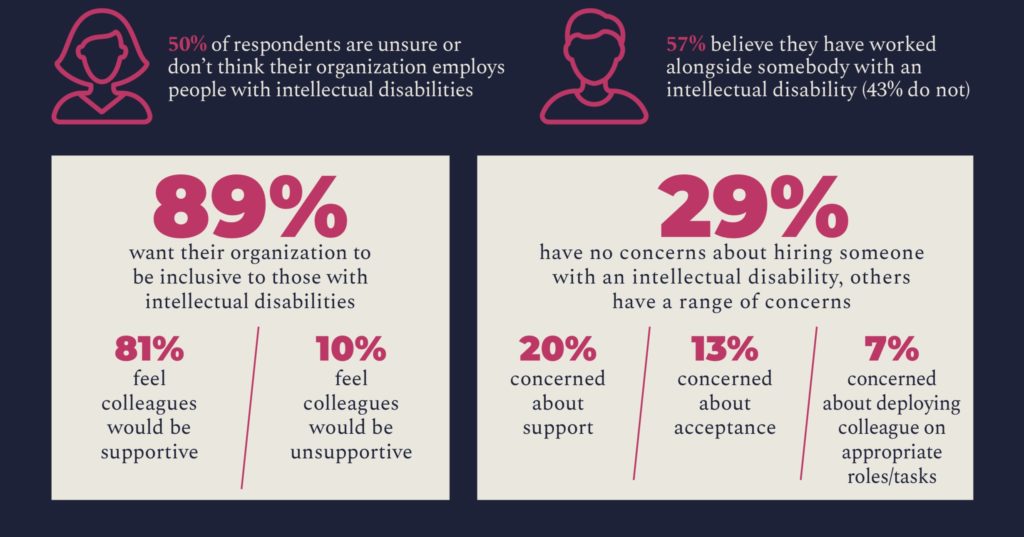Workplace diversity, equity and inclusion (DE&I) efforts often exclude intellectual disabilities, suggests new research carried out by Skillsoft.
The survey, carried out by in partnership with the Special Olympics, indicates that most HR and learning professionals do not understand how to make their workplace more accessible for people with intellectual disabilities; and why doing so is important to achieving full inclusion. Even though the vast majority (88%) of respondents work for companies with a DE&I policy, 55% are not confident their organisation has any guidance related to intellectual disabilities.
The survey also indicated that organisations are willing and ready to learn more about inclusion of people with intellectual disabilities. However, respondents believed that “efforts could fall behind without proper training”. While 81% of HR staff suggest their colleagues would be at least somewhat supportive in the inclusion of people with intellectual disabilities, there’s still hesitation. The biggest concern for 33% is “how people without an intellectual disability would engage with those who do have an intellectual disability”.
LACK OF UNDERSTANDING
“Many organisations lack the appropriate level of understanding and action on how to create a culture of ‘true inclusion’,” stated Mark Onisk, Chief Content Officer of Skillsoft. “Even though 87% of people who took this survey confirmed interest in being more inclusive, they are missing the essential step of ‘how’. That’s where learning and development comes in.”
Results also indicate there is demand for change. Approximately 93% of respondents believe that becoming an inclusive organisation would help a company’s culture. In fact, 76% of respondents report their management or leadership would be at least somewhat supportive of becoming more inclusive of people with intellectual disabilities.

“It’s clear that many leaders are primed for substantial change,” said Denis Doolan, Chief of Organisational Excellence at Special Olympics. “With transparent conversation and investing in a culture of learning that brings about open-minded thinking and positive action, this essential conversation is ready to come to the forefront.”
PRESCRIPTIVE PATH TO INCLUSION
“The key to meaningful change is a focus on developing a policy that is backed by action. Even in organisations with thoroughly designed DE&I policies, inclusive behaviours must go beyond policies and statements,” added Doolan. “Having a policy in place does not mean the work is done.” One survey respondent indicated that “policy is good, but needs more action to support it, [and] more focus at the leadership level”.
To be meaningfully inclusive will require a concerted effort to provide training and information to employees. The timing for change is right. Data also indicated that support for creating truly inclusive workplaces is surging. A follow-up survey reveals that 63% HR and learning professionals are interested in creating a more inclusive culture, confirmed Skillsoft.
DISABILITY INCLUSION TIPS
The Special Olympics suggest the following tips for promoting workplace inclusion in your workplace:
- Promote and support learning opportunities for people with intellectual disabilities to learn skills that prepare and enable them to contribute to communities/workplaces.
- Work together with people with intellectual disabilities to create an environment that is inclusive of their needs; and allows them to demonstrate and contribute their skills and talents.
- Include voices from every level of the organisation in the DE&I conversation. Ensure an added focus on ability levels and differences.
- Integrate inclusive practices in meetings, materials and social behaviours to enable people with intellectual disabilities to actively contribute. For example, simplify materials, avoid jargon, facilitate sharing of diverse opinions, and support diverse learning needs and styles.
The survey was carried out to coincide with International Day of Persons with Disabilities. More than 1,000 survey participants, comprising of primarily professionals in the HR and learning space, took part in the study.
Organisations must not overlook invisible disabilities either, according to AbilityNet. Continue reading here.







































